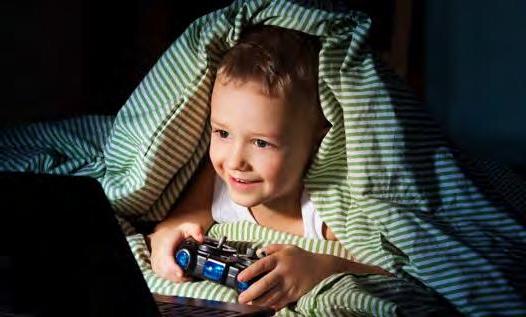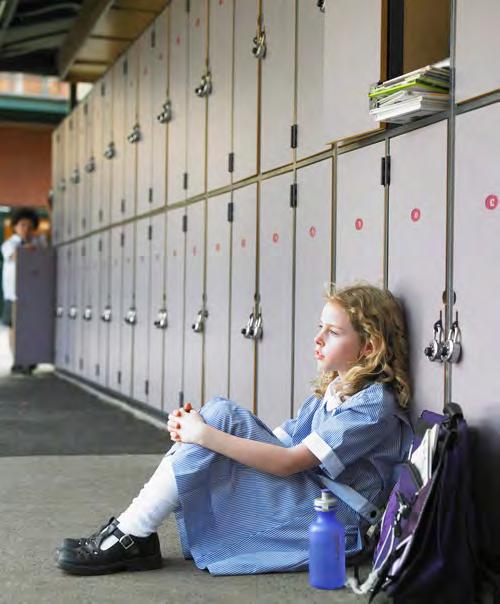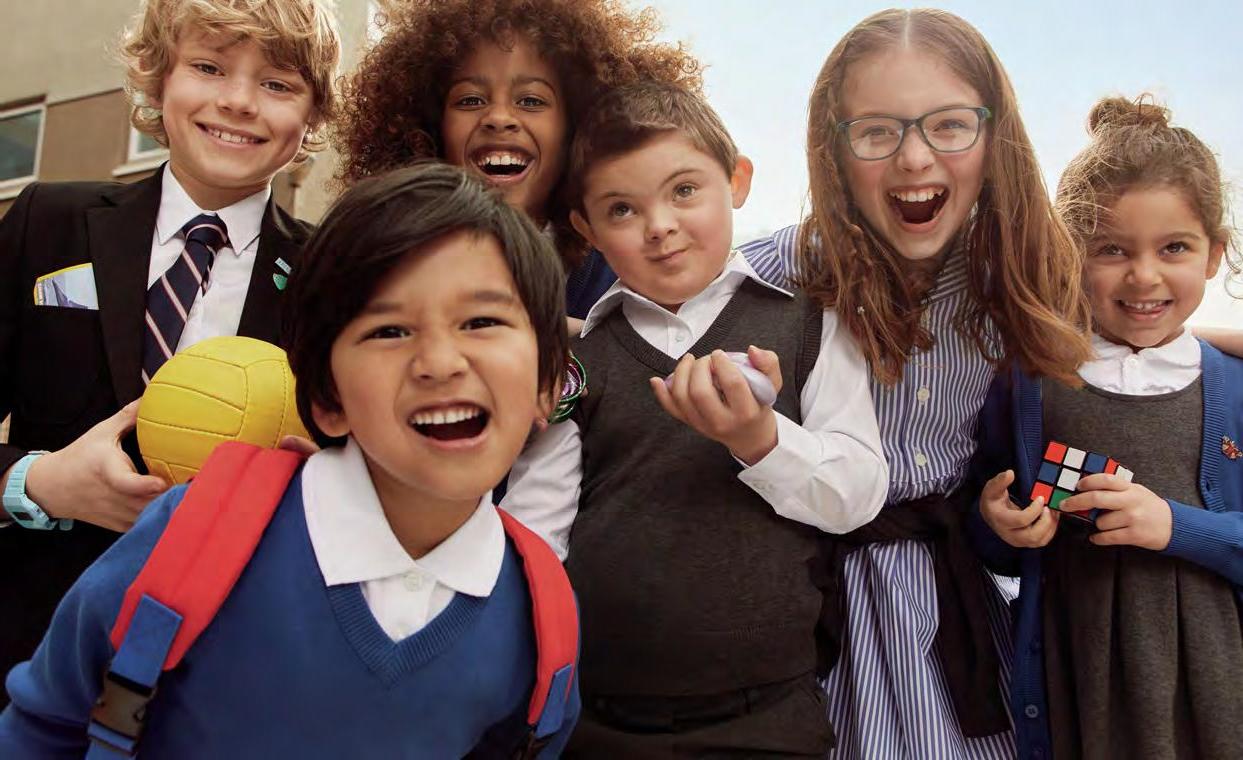
11 minute read
Tackling gaming issues
Gift idea for the What’s On Parenting listings for all the family Here are some useful resources and websites that can help to support you and your child during change and emotional times, including little cooks in Compiled by Anna Blackshaw mindset techniques and books. your life To promote your local event, coffee morning, nearly new sale, parenting courses or community group in the next What’s On listing (March/April 2020 issue) send your entry by 1 Feb 2020. Email Listings@FamiliesNWLondon.co.uk. CBeebies – Helping Children Deal with Change/Helping Children Starting Primary School Little Cooks Co is a monthly subscription Listings in this section are FREE for most non-commercial ventures. Please check details of the events before setting off in case anything has changed since going to print. www.bbc.co.uk/cbeebies/grownups/helping-childrendeal-with-change based recipe kit that’s posted through www.FamiliesOnline.co.uk for all our local weekly regular events. It’s updated every day! www.bbc.co.uk/cbeebies/grownups/how-to-preparethe letterbox, direct to kids, in a neat your-child-for-primary-school 100% recyclable box with compostable packaging. What’s On Jan/Feb 2020 - Issue 133 JANUARY Helping your Child Deal The Art of Simple – 14 Books to Help Ease Children through Transitions The box www.theartofsimple.net/14-books-to-help-easeis packed with all the Fri 3 Jan - Pantomime Pandemonium (UB10) Get into the pantomime spirit with games and activities inspired by the Great British pantomime, in this hour-long session at Oak Farm Library with Change By Samantha Francis children-through-transitions The Pathway 2 Success natural and from 3pm. Suitable for ages 6 to 10. Free event - no need to book. - Making a Coping Strategies Wheel healthy dry ingredients of that month’s delicious and nutritious recipe for kids to bake in the home. Kits come complete with all of the dry, organic ingredients perfectly measured to make each recipe and also include a small activity or craft for children to enjoy while making their yummy bake. Each www.hillingdontheatres.uk Sat 4 – Sun 5 Jan - Woolly Jumpers (SE10) Boing and bounce a fluffy sheep made with wool just like the stuff Cutty Sark used to carry all the way from Australia! 11:30am-1:30pm and 2-4pm at Cutty Sark. www.rmg.co.uk Wed 8 Jan - Bach to Baby Family Concert (NW3) Bach to Baby is the acclaimed concert series for the whole family to enjoy together. Featuring outstanding musicians and exhilarating performances in inspiring venues right on your doorstep. 10.30am at Hampstead Burgh House. www.bachtobaby.com Change can be a challenge for both parent and child, and is very often a trigger for a range of emotions. Right now, as the world continues its journey back to some kind of ‘normality,’ it is important that you can help your child deal with the many changes that will come with this, including returning to school. to hold space for your child’s emotions and understand how to help them. Seek support for yourself, even if it is just a chat with a friend. Remember that it is okay to be honest about your own emotions with your child as that will create connection between you and help your child understand that their emotions are also experienced by others. www.thepathway2success.com/how-to-make-acoping-strategies-wheel/ Hand in Hand Parenting – Anxious about Starting School www.handinhandparenting.org/2018/08/anxiousabout-starting-school/ Starting School by Janet and Allan Ahlberg Available from Amazon Big Big World by Samantha Francis Available from Amazon recipe is fun and easy to make and has been designed by a registered nutritionist, so is free from all refined sugar and processed ingredients. Subscriptions start from £8.99/month www.littlecooksco.co.uk Sat 11 Jan & Fri 7 Feb – Dino Snores for Kids (SW7) Ever wonder what happens in the Museum when everyone’s gone home? The night begins as you set up camp in one of the Museum’s spectacular galleries, and there will be plenty to learn and discover during your stay at the Museum. Stalk the galleries as night descends and find T. rex in hidden in shadows. At midnight, it’s time to settle down to sleep. For ages 7-11. www.nhm.ac.uk Change, when not supported appropriately by a caring adult, can feel like a traumatic experience for a child. This can then manifest as emotional issues down the line, so it is important that a child is supported gently and feels seen and heard when change is occurring. Imagine Children’s Festival 12-23 Feb Prepare your child. Talk about the forthcoming changes. Giving your child advance notice will help them be more prepared. Read books or watch television shows that your child can relate to about the changes they are going to be dealing with. Settling in The first half of this new term will see your child reconnecting with friends and classmates they may not have seen for months, getting to know a new teacher or Paediatric First Aid Courses Paediatric First Aid Courses It’s useful to remember also that children connect through fun, so while it is important to talk about change and the feelings associated with it, it’s also necessary to balance this up with time to play. In essence, children need time to process the change but also time away from focussing on it. With the new school year approaching, here are some tips that can support your child: Deal with your emotions first. Be aware of your own anxiety around the changes you are dealing with. When you can hold space for your own emotions and know how to support yourself, it makes you more able Fri 17 – Sun 19 Jan - London Model Engineering Exhibition (N22) Now in its 24th year, the popular exhibition returns to the iconic Alexandra Palace. This leading exhibition for model engineers continues to enthral visitors and enthusiasts alike with thousands of scale models from the early age of steam engines right up to today’s modern marvels. There will be plenty of ‘hands on’ activities for children to participate in, from creating a large LEGO mosaic at the Fairy Bricks stand to taking part in model experiments at the Imagineering Foundation stand science lab or even a treasure hunt! www.londonmodelengineering.co.uk Mon 20 Jan - Tiny Troopers: Posters (SW3) Take your little ones to the toddlers’ session at the National Army Museum, perfect for ages 2 to 4. Sing, play and create with your little one - each time, Tiny Troopers will have a different theme, with this session being inspired by Army posters. Sessions start at 10am and 11.20am, and last approximately 45 minutes. www.nam.ac.uk Sat 25 Jan - Chinese New Year (SE10) Visit the National Maritime Museum and celebrate the Year of the Rat. This family-friendly day will include make and take craft workshops, stories, performances, and a traditional Lion Dance. www.rmg.co.uk Sat 25 Jan - Tiny Groovers: A Day-Time Party for Under 5s and their Adults (E2) Visit the V&A Museum of Childhood to let loose and stomp your feet with your Tiny Groovers. Dance away the January blues and enjoy a DJ set from Mr Manic of Lucky Dip Disco and the surreal and spectacular storytelling from The No-Shamen. Other activities include a movement session with a contemporary dancer, arts activities and sensory experiences for babes. 1-3pm. www.vam.ac.uk/moc Sat 25 Jan - Inventors of Tomorrow Family Workshop (W11) Are you looking for some quality family learning? Enjoy fun for the whole family at the Museum of Brands as you experiment, learn and explore the world of technology, with the unique Inventors of Tomorrow workshop in collaboration with tech toy experts, Big Clown. 2-3pm. amy@museumofbrands.com www.museumofbrands.com Listen to your child. Validate their feelings. It’s okay for them to feel what they feel. Don’t be tempted to try to rescue them from their feelings or tell them not to worry. By just letting them express how they feel, many children will feel better and this will lead to finding solutions to their worries. Observe your child’s physical needs too. If your child exhibits increased anxiety it is also beneficial to reflect with them on stressful past events they dealt with successfully. Samantha Francis is a mum of two, best-selling author and parenting and relationship specialist. even settling in at a new school. Observe how your child feels around communication. Kids are often nervous about making new friends through fear of rejection and some role play might help them in the coming weeks. You could practise some conversation starters or developers to get them feeling confident about speaking to new people or getting to know other children better. If your child has specific worries in their first few weeks back at school or is highly anxious about specific things or more generally, do share this with their teacher so he/ she can support you both. Teaching your child different types of mindfulness activities such as breathing and relaxation will also help them should they start to feel overwhelmed at school. These techniques can also be useful if they are struggling to settle to sleep at night. Remember that it’s best to practise the techniques fairly frequently in order for your child to be able to implement them confidently in stressful situations.
Sun 17 Nov, Sat 7 Dec, Sat 18 Jan - Harrow on the Hill BOOK NOW! Harrow on the Hill Sat 26th Sept; Thurs 1st Oct; Sat 31st Oct Suitable for Ofsted Registration. Suitable for Ofsted Registration. Includes some home study. Includes some home study. Certificate valid for 3 years Cost = £85 Certificate valid for 3 years Cost = £85 Contact Margaret at mcstraining@hotmail.co.uk or on 07814 191 395 for bookings Other dates available Contact Margaret at mcstraining@hotmail.co.uk or on 07814 191 395 for bookings


Tackling your Child’s Gaming Issue

By Dr Michele McDowell
As an educational psychologist, I am witnessing an increasingly common pattern: once children and young people have had complete access to electronics for six months or more, their behaviour begins to change. Research has shown that excessive gaming can have a chemical effect on the body; MRI studies have found that gaming produces dopamine (a feel-good chemical) and the production of dopamine pushes the gamer to seek bigger thrills each time. Psychologists at the International Gaming Research Unit at Nottingham Trent University found that, compared with healthy individuals, excessive gaming leads to young people exhibiting behaviours similar to people suffering with drug addictions.
So concerning has this pattern of behaviour become that the DSM5 (Diagnostic and Statistical Manual of Mental Disorders) has identified Internet Gaming Disorder (IGD) as an area of concern.
Alarmingly, the groups of people most impacted by IGD are children and teenagers. The most recent OFCOM study indicated that weekly hours spent gaming increase with age, ranging from 6 hours 12 minutes for ages 3 to 4 years to 13 hours 48 minutes for ages 12 to 15 years. Does my child have a problem? I talk parents that are concerned that their child might have a gaming addiction through the DSM5 criteria. The DSM5 criteria suggests that children exhibiting 5 or more of 9 criteria within a 12-month period may identify as having IGD. These criteria include:
1. Preoccupation with games: thinking about previous gaming activity or anticipating playing the next game; gaming becomes the dominant activity in daily life. 2. Withdrawal symptoms when gaming is taken away. Symptoms are typically described as irritability, anxiety, or sadness.
3. T olerance: the need to spend increasing amounts of time engaged in games. 4. Unsuccessful attempts to control or reduce participation in games. 5. Loss of interest in real-life relationships, previous hobbies, and other entertainment.
6. Continued excessive use of games despite knowledge of psychosocial problems. 7. Has deceived family members, therapists,
or others regarding the amount of gaming. 8. Use of games to escape or relieve a negative mood (e.g. feelings of helplessness, guilt, or anxiety). 9. Has jeopardised or lost a significant relationship, job, educational or career opportunity because of participation in games. What does it mean if my child is showing signs of excessive gaming? As more professionals become aware of IGD, we are also seeing an increase in more traditional disorders such as childhood bipolar disorder, attention deficit hyperactivity disorder (ADHD or ADD) and Tic disorders along with an associated increase in prescribed medication. This increase in diagnosis coupled with the knowledge that some children and young people may be more vulnerable to the impact of gaming, for example those with mental health needs such as depression, anxiety and ADHD, makes the concern even more important. What should I do if my child is showing signs of excessive gaming? Parents are desperate to know what they can do to get their children back. I advise the following ABC approach: Awareness: Write down how much actual screen time and gaming your child is taking part in. Be honest.
Behaviour: introduce a range of strategies to reduce gaming by: Setting up a gaming contract/ chart with clear boundaries about when/for how long games can be played. Introducing alternative activities and rewards chart. Implementing a regular screen withdrawal/gaming detox.
Communication: Continually talk to your child about online safety. Discuss the different aspects including privacy settings (ensure that they are not sharing their location), personal information and images, and how they can block unwanted messages. Talk about the type of information that can be shared online, online identities and not meeting people they don’t know offline. Keep communication open; it’s essential that your child feels that they can discuss technology with you in a non-judgemental space. If you are feeling overwhelmed by how to manage gaming and screen time boundaries, then please look for support and seek professional advice.
Dr Michele McDowell is child and education psychologist, with 18 years’ experience in her field. In the last 5 years she’s seen a significant increase in cases involving excessive gaming behaviour in children and is keen to help change behaviour. For more information, visit www.mefinition.org/ gaming









